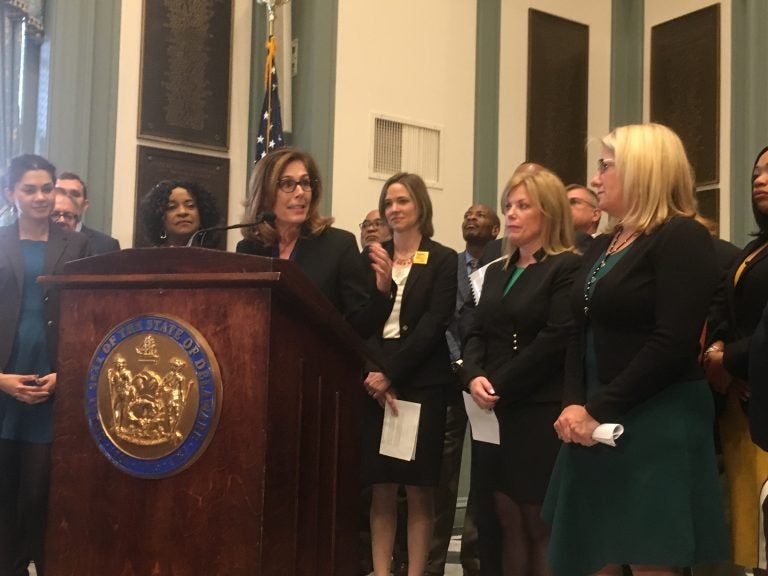Far-reaching changes proposed for Delaware’s criminal justice system
Attorney General Kathy Jennings joined Delaware lawmakers to unveil a package of bills she calls “the boldest criminal justice reforms in modern state history.”

Delaware Attorney General Kathy Jennings unveils a package of criminal justice reform bills surrounded by state lawmakers in Legislative Hall in Dover. (Mark Eichmann/WHYY)
Attorney General Kathy Jennings joined more than a dozen Delaware lawmakers in Dover Thursday to unveil a package of 19 bills she calls “the boldest criminal justice reforms in modern state history.”
From making it easier to expunge criminal records to expanding a judge’s ability to modify sentences for conditional release due to prison overcrowding, this sweeping package of bills looks to significantly overhaul Delaware’s criminal justice system.
“We are not settling for business as usual anymore in the state of Delaware,” said state House Majority Leader Valerie Longhurst. “We want our system to work for Delawareans — a system that should focus on accountability, reform, and restoration.”
Jennings has already made big changes since taking office in January, announcing last month that her office will no longer prosecute people who are caught with less than 175 grams or about six ounces of marijuana.
She said this legislation offers the state “an opportunity to lead the nation by rejecting the false cynical choice between progress and public safety, between compassion and justice.
“We can and must choose both. And we will.”
The package includes a bill that would give a judge discretion to allow sentences to be served concurrently instead of consecutively. Currently, in some cases, judges have no choice but to apply sentences for multiple offenses to be served consecutively. Sometimes referred to as stacking, that practice has caused very long prison terms for some defendants and contributed to crowded conditions in Delaware’s prisons.
“Our prisons are operating beyond their designed capacity and the cost of maintaining the correction system continue to balloon,” said Karen Lantz of the Delaware ACLU. “Our criminal justice system falls particularly harshly on people of color and the poor. African-Americans make up only 23 percent of Delaware’s population, but 60 percent of its prison population.”
Delaware’s prison population has been a hot topic in Dover over the past few years. The state has been working to increase employment among correctional officers by increasing starting pay and creating a career ladder for officers to move up.
But despite those efforts, the state is still struggling with overcrowding. Last year, the state announced plans to move hundreds of Delaware inmates to prisons in Pennsylvania for two years at a cost of nearly $30 million.
Dubard McGriff works with the ACLU’s Campaign for Smart Justice. He’s particularly pushing for a bill to make it easier to expunge convictions from a former inmate’s record.
“This expungement bill would do a lot, and stop a lot of barriers and collateral damage for individuals like myself to be successful,” he said.
McGriff has felt the weight of the criminal justice system first hand. Arrested at age 16, he served four years in prison starting in 2001.
“If this would have been in place years ago, I wouldn’t have gone through half the things I went through,” McGriff said. “It took me probably almost eight years to find a good-paying job.”
The package also includes measures designed to help former inmates find work. Several bills would change the impact of a criminal record for those trying to become licensed masseuses, HVAC examiners, or electrical examiners. Another bill would provide tax credits to employers who hire qualified ex-offenders. The employer could get back 10 percent of that worker’s wages in the form of a tax credit.
It’s unclear what the future will be for all 19 pieces of legislation in Dover.
Lawmakers are still shopping the bills around Legislative Hall in hopes of getting more sponsors before they are formally introduced.
A spokesman for Gov. John Carney’s spokesman said the governor “supports efforts to make Delaware’s criminal justice system more fair for all Delawareans.”
He said Carney’s focus has been on improving the state’s reentry program to make sure inmates are able to successfully return to their communities, and the governor is still reviewing the proposals.
WHYY is your source for fact-based, in-depth journalism and information. As a nonprofit organization, we rely on financial support from readers like you. Please give today.





